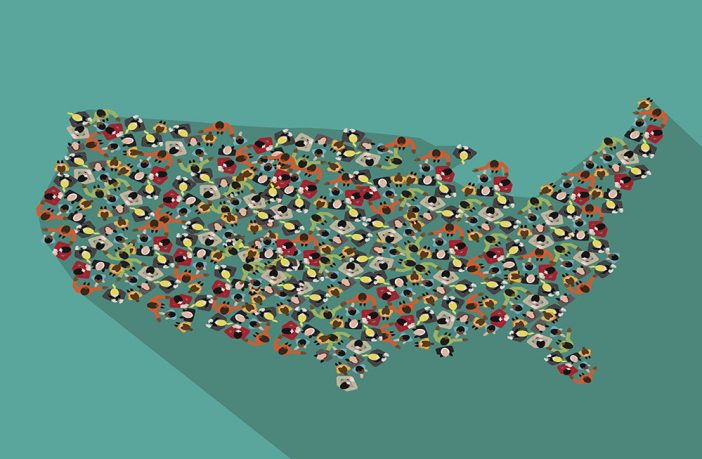Much of the debate over immigration is generated by the different perspectives of nationalists and internationalists. The internationalists – or one-worlders – tend to seek a future without borders and, therefore, no or little restriction on immigration. Those who see a continuing need to manage immigration to benefit the country, and believe that a nation’s citizens have a right to determine their own destiny, may be considered nationalists.
The new crop of far left socialist politicians (as opposed to traditional liberals) clearly fall into the internationalist camp as exemplified by Speaker Pelosi’s reference to border barriers as immoral. This is not to say that all liberals are for open borders. That extremist focus is a recent development, as liberals in the past also supported immigration restriction.
Nationalists, on the other hand, generally support immigration restrictions designed to exclude persons considered a public threat, e,g, criminals, and to moderate to flow of newcomers so as not to disrupt the labor market or the absorptive capacity of the state.
Unfortunately, there is a strain of nationalism that includes prejudice against immigrants based on their race or religion or other personal characteristic. That ugly strain of nationalism is often seized upon by the internationalist to denigrate all who approach immigration from a national perspective.
Historian Jill Lepore, writing in the February 5 issue of Foreign Affairs (“Why a Nation Needs a National Story”), traces the abandonment of nationalism by most current historians and argues that this weakens the country. She also addresses the split attitudes towards immigration among nationalists. She refers to those who approach immigration from an inclusive perspective – insisting on shared rights and opportunities – as liberal nationalists and those who would restrict immigration on the basis of immutable characteristics as illiberal nationalists.
From the perspective of FAIR, this is a useful distinction. It separates the policies advocated by the organization – welcoming a reduced but unprejudiced immigrant flow – from those who advocate discriminatory immigration restrictions. The challenge is to make that difference as clear as the difference between an internationalist open borders policy and a national policy advocating a moderate unbiased immigration flow.





5 Comments
I support Controlled Legal Immigration,, I DO NOT SUPPORT ONE WORLD ORDER!! I DO NOT SUPPORT OPEN BORDERS! I DO NOT SUPPORT SANTURARY CITIES OR STATES! I SUPPORT EXSISTING LAWS!! ENFORCE EXSISTING LAWS.
Cracks In the WALL Shutdown Negotiations Today?
It appears more than a few Democrats want the WALL now too…
The polls of those who actually watched the State of the Union were overwhelmingly favorable to Trump. His scores among both Republicans and independents were very high, which has to tell you something. First, the people who actually watch have to be those who are the most politically aware. Second, and more important, is that when he gets to speak directly to the public he comes off well. Often he’s pretty funny, in a think on your feet way.
The point is that when he is able to break past the filter of the news media that insists that their “analysis” is what you need to know, he can get his message across. It was no accident that a couple months ago one of the CNN hosts suggested that no one should carry him speaking live. They would supposedly edit out that which was untrue. And considering that the media relies on “fact checking” sites that overwhelmingly spin left, it’s hard to argue we have a functioning free press.
Trump got criticized for bashing McCain at a press luncheon a couple days ago. Talk about an internationalist. McCain worked tirelessly, while pretending otherwise at election time, for what were in effect open borders. He also pushed every war he could get us into and denounced anyone who suggested maybe we should stop doing that. The guy was certainly able to remember Viet Nam, the classic example of not thinking before rushing in. Like Bush Jr., another internationalist like his whole family, McCain was an unqualified legacy goof-off. Absent his family connections he would have been kicked out of West Point in no time.
Sure, let’s let BILLIONS of people from the overpopulated Crap Holes around the globe come here; the More, the Merrier! It’s not as if energy, water, open space, raw materials and other resources are in finite supply! Good intentions will make everything that two or three billion people need for a 1st World standard of living magically appear. There won’t be any environmental consequences, either!
a little blunt and you were sort of bashing but ll of the statements om resources and using them up is absolutely true. If you had an apple pie and 8 people you will each get a slice, Add a hundred people and you can each lick the fork. That is how unlimited population growth will and is impacting the world. We will each have less and there will be no way to improve your ability to improve. Just look at the clean water supply as a prime example. The internationalist are already planning on us not being able to grow real food but vat grown tofu etc to feed the masses. So how to wise up and find a stable population is the real answer and no one wants to address this anywhere in the world. In fact they are telling us we need a billion people so we can compete with China and India both of which have huge resource problems.